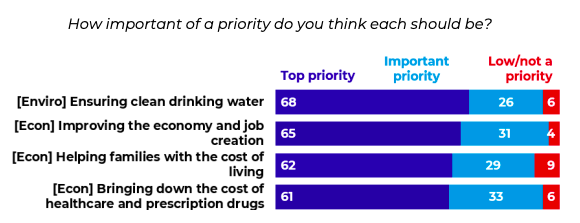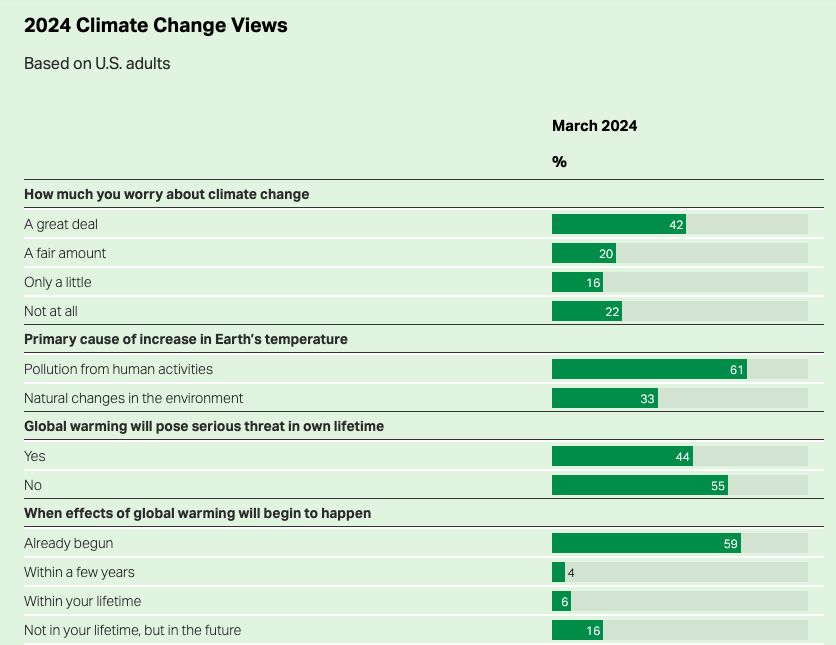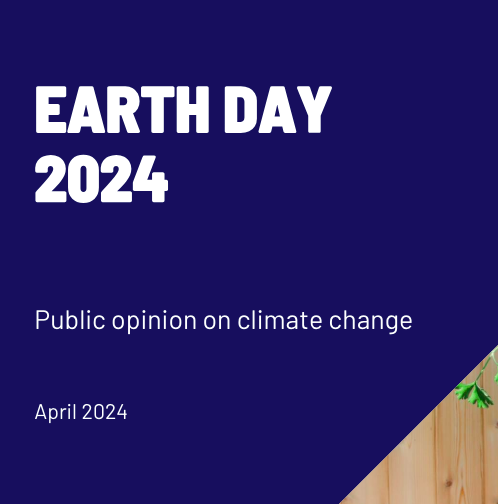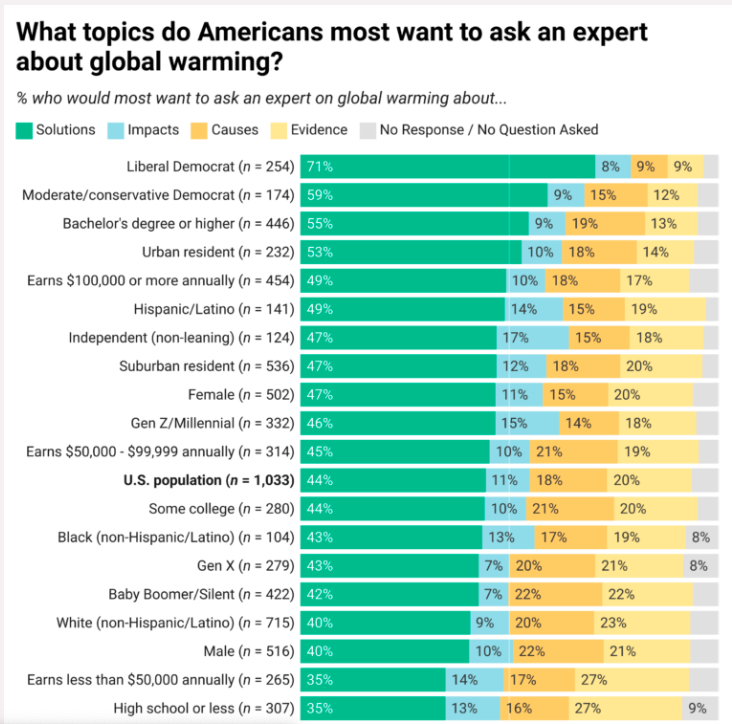Resources
Search below for resources covering the intersection of climate engagement, social science and data analytics.
RESULTS
Environmental Polling Roundup - April 26th, 2024
This post includes climate and environment headlines, data points, and key takeaways from recent public polls - including new polling on climate action, the Biden administration’s climate and environmental record, extreme weather, and Americans’ top environmental priorities.
HEADLINES
Voters recognize plastic pollution as a major problem and an overwhelming, bipartisan majority support the U.S. joining a Global Plastics Treaty. Most voters rate plastic pollution as a “crisis” or “major problem” both globally (79%) and in the United States (70%). When it comes to measures to “reduce the production of plastics” specifically, 87% say that they support this type of action – including large majorities of Democrats (94%), independents (80%), and Republicans (80%). Voters across party lines support the U.S. joining a Global Plastics Treaty.
Pollution of drinking water remains Americans’ top environmental concern, and few ever say that the government is doing “too much” to protect the environment. 62% of Americans say that they worry at least “a fair amount” about climate change, including 42% who worry “a great deal” about it. 61% of Americans recognize that pollution from human activities is the primary cause of increases in the Earth’s temperature over the past century. 59% of Americans recognize that the effects of global warming have already begun. Only 19% of Americans say that the U.S.
Steady majorities of Americans say that the government should do more to address global warming and will be failing the American people if it doesn’t take action. However, Americans have mixed attitudes about the economics of climate action. 56% of Americans agree that the U.S. should do more in the fight against climate change. 54% of Americans agree that the U.S. government will be failing its people if it does not act now to combat climate change.
CBS News poll finds big majority of Americans support U.S. taking steps to reduce climate change
Americans have heard little about the Biden administration’s climate efforts, but the administration’s climate and environmental policies are popular when people learn about them. Seven in ten Americans (70%) support the U.S. “taking steps to try to slow or stop the rate of climate change,” including nine in ten Democrats (91%), two-thirds of independents (68%), and around half of Republicans (48%). 53% of Americans support policies that would encourage the production of more electric or hybrid vehicles and fewer gas-powered vehicles in the U.S.
Environmental Polling Roundup - April 19th, 2024
This post includes climate and environment headlines, data points, and key takeaways from recent public polls - including new polling on Americans’ climate attitudes, climate-related provisions in President Biden’s budget plan, and plastic pollution.
HEADLINES
A steady seven in ten Americans recognize that climate change is happening, including a particularly high percentage of AAPI adults. Americans rate Biden far better than Trump on climate change, but only three in ten say that Biden has made a positive impact on the issue. 67% of Americans say that oil and gas companies are doing too little to address climate change. 58% of Americans say that oil and gas companies have “a lot” of responsibility to address climate change. The majority of Americans (56%) say that the federal government is doing too little to address climate change.
Voters strongly support provisions in President Biden’s budget to close Big Oil tax loopholes and lower energy costs. Roughly three-quarters (77%) support Biden’s proposal to “close tax loopholes that benefit Big Pharma, Big Oil, and wealthy corporations,” including a majority (56%) who strongly support this proposal.
What do Americans want to know about climate change?
Americans are more interested in hearing about solutions to climate change than causes, impacts, or evidence. Yale and GMU find in a new analysis that far more Americans would ask about solutions (44%) than evidence (20%), causes (18%), or impacts (11%). Left-leaning audiences are particularly eager to hear about solutions, but conservative audiences still want to hear about the evidence and causes. Of major political and demographic subgroups, Yale and GMU find that liberal Democrats (71%) are the most likely to say that they would ask solutions-focused questions.
Environmental Polling Roundup - April 12th, 2024
This post includes climate and environment headlines, data points, and key takeaways from recent public polls - including new polling on electric vehicles, young Americans’ attitudes about climate change and President Biden’s climate actions, and the SEC’s new climate risk disclosure rule.
HEADLINES
Pagination
- Page 1
- Next page






